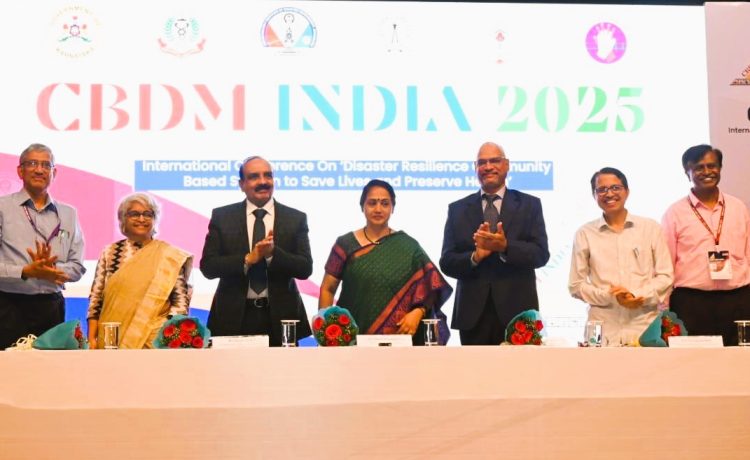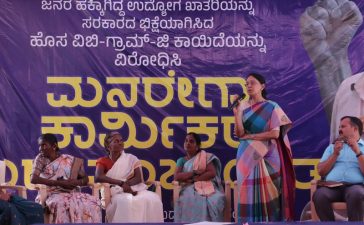Community Participation Key to Disaster Management: Karnataka Chief Secretary Shalini Rajneesh
BENGALURU, June 20: Disaster preparedness and response cannot succeed without active public participation, said Karnataka Chief Secretary Dr. Shalini Rajneesh, while inaugurating the international conference “CBDM India 2025” on Thursday. The two-day conference, titled Disaster Resilience: Community-Based Systems to Save Lives and Preserve Health, is being held at the JN Tata Auditorium in the Indian Institute of Science (IISc), Bengaluru.
Organized by Jeeva Raksha Trust in collaboration with institutions including IISc, Rajiv Gandhi University of Health Sciences (RGUHS), the Indian Medical Association (IMA) Saragur, the Swami Vivekananda Youth Movement, and key national agencies such as ISRO and NIMHANS, the event has drawn over 800 participants, including officials from disaster management agencies, the armed forces, healthcare experts, academics, and youth networks.
“Community Responsibility is Crucial”
Dr. Rajneesh underlined the importance of collective responsibility in disaster management. “The government can make rules, but unless communities are aware and act responsibly, we cannot prevent tragedies,” she said.
Recalling the recent landslide in Shirali, Ankola (Uttara Kannada district) that claimed nine lives from a single family, she said, “This loss could have been prevented if the family had not built a house and tea shop in a known landslide-prone area. The administration could have evacuated them, but such decisions are complicated when people depend on those places for their livelihood. This is the daily dilemma authorities face.”
Dr. Rajneesh also referred to her earlier experiences as Deputy Commissioner of Belagavi, where she faced major challenges during floods caused by the release of water from Maharashtra’s Koyna dam. She stressed that better community awareness and adherence to safety norms can help avoid such situations.
Flood Alerts and Urban Challenges
Speaking on state preparedness, the Chief Secretary shared that Karnataka’s disaster management cell has access to more than 70 lakh farmers through mobile contact lists, enabling the state to quickly alert them during emergencies like floods or droughts.
On the issue of recurring urban flooding in Bengaluru, she noted that 201 flood-prone locations have been identified across the city. “Many of these locations have constructions without proper government approvals. Eviction or rehabilitation becomes difficult because any action can be seen as anti-people. Hence, we need community cooperation. People must realize the threat to their lives and the inconvenience such encroachments cause during floods,” she said.
Dr. Rajneesh also highlighted the rise in climate-related fatalities, stating that 3,080 deaths occurred last year—a rise of 18% over the previous year. “Even man-made disasters are increasing. We must all be alert and involved,” she added.
National Perspective on Community Resilience
Joining the conference virtually, Lt. Gen. Syed Ata Hasnain (Retd.), Member of the National Disaster Management Authority (NDMA), emphasized that disaster management must start from the ground up.
“Disasters are not just humanitarian crises—they can change history,” he said. Citing the 1970 cyclone in East Pakistan (now Bangladesh), which killed hundreds of thousands and triggered political upheaval, he added, “In any high-risk area—be it a conflict zone or a floodplain—the community is always the first responder. India’s resilience must be built bottom-up.”
Lt. Gen. Hasnain stressed that “awareness and community engagement are the two most important pillars of disaster response,” urging stronger grassroots coordination along with government action.
Building Local Health Response
Earlier, setting the stage for the conference, Dr. (Flt Lt) M.A. Balasubramanya, Managing Trustee of Jeeva Raksha Trust and Chairman of the Organising Committee, emphasized preparedness.
“In any disaster—natural or man-made—saving every life is a victory. At CBDM India 2025, we focus on health, speed, and compassion. We are training people, strengthening health systems, and localizing responses,” he said.
Mental Health in Disaster Response
Adding to the discussion, Dr. Pratima Murthy, Director of NIMHANS, stressed the importance of integrating mental health support in emergency response frameworks.
“Psychosocial care must be part of every emergency protocol, from village level to the state level,” she said, noting that emotional trauma often lingers long after a disaster ends.
Conference Participation
The conference brought together delegates from multiple sectors, including state and national disaster response teams, armed forces, health institutions, academic experts, and civil society members.
Other notable attendees included:
-
Dr. Ram K. Nair, Technical Director, Jeeva Raksha Trust & Organising Secretary, CBDM 2025
-
Dr. M.R. Seetharaman, Indian Medical Association (IMA)
-
Dr. B.C. Bhagavan, Vice-Chancellor, RGUHS
-
V.V.S. Sreenivas, Director, Institute for Research and Innovation in Disaster Management (IRIDM)
-
Dr. Navakanta Bhat, Director, Centre for Neuroscience, IISc
The conference continues on Friday with technical sessions and collaborative workshops aimed at strengthening local capacity and knowledge-sharing for disaster risk reduction.
🔹 Key Quotes:
“Governments can make rules, but it is the community that must act responsibly to prevent disasters.”
— Dr. Shalini Rajneesh, Chief Secretary, Government of Karnataka
“Evacuation becomes complex when people’s livelihoods are tied to disaster-prone areas.”
— Dr. Shalini Rajneesh
“In any high-risk environment, the community is always the first responder.”
— Lt Gen (Retd) Syed Ata Hasnain, Member, NDMA
“Our goal is to build a disaster-ready society with health, speed, and compassion at its core.”
— Dr. M.A. Balasubramanya, Jeeva Raksha Trust
“Mental health support must be part of every emergency response, from the village to the state level.”
— Dr. Pratima Murthy, Director, NIMHANS
![]()












tauvj7
Discover the excitement of online gaming with [url=https://exbet-login.com/]ex bet[/url], your ultimate destination for thrilling bets and big wins.
Knowing the meaning of an ex bet can help bettors make more informed decisions.
Experience thrilling wins and endless entertainment at [url=https://777bet-registration.com/]777bet[/url], your ultimate destination for online gaming.
Moreover, frequent promotions and bonuses help to keep users engaged and motivated to continue betting.
XEvil 5.0 automatically solve most kind of captchas,
Including such type of captchas: ReCaptcha v.2, ReCaptcha-3, Google, Solve Media, BitcoinFaucet, Steam, +12000
+ hCaptcha, FC, ReCaptcha Enterprize now supported in new XEvil 6.0!
+ CloudFlare TurnsTile, GeeTest captcha now supported in new XEvil 7.0!
1.) Fast, easy, precisionly
XEvil is the fastest captcha killer in the world. Its has no solving limits, no threads number limits
2.) Several APIs support
XEvil supports more than 6 different, worldwide known API: 2captcha, anti-captchas (antigate), RuCaptcha, death-by-captcha, etc.
just send your captcha via HTTP request, as you can send into any of that service – and XEvil will solve your captcha!
So, XEvil is compatible with hundreds of applications for SEO/SMM/password recovery/parsing/posting/clicking/cryptocurrency/etc.
3.) Useful support and manuals
After purchase, you got access to a private tech.support forum, Wiki, Skype/Telegram online support
Developers will train XEvil to your type of captcha for FREE and very fast – just send them examples
4.) How to get free trial use of XEvil full version?
– Try to search in Google “Home of XEvil”
– you will find IPs with opened port 80 of XEvil users (click on any IP to ensure)
– try to send your captcha via 2captcha API ino one of that IPs
– if you got BAD KEY error, just tru another IP
– enjoy! 🙂
– (its not work for hCaptcha!)
WARNING: Free XEvil DEMO does NOT support ReCaptcha, hCaptcha and most other types of captcha!